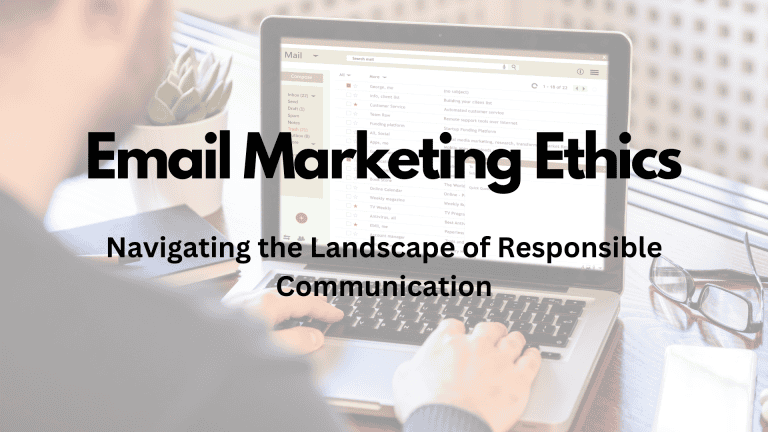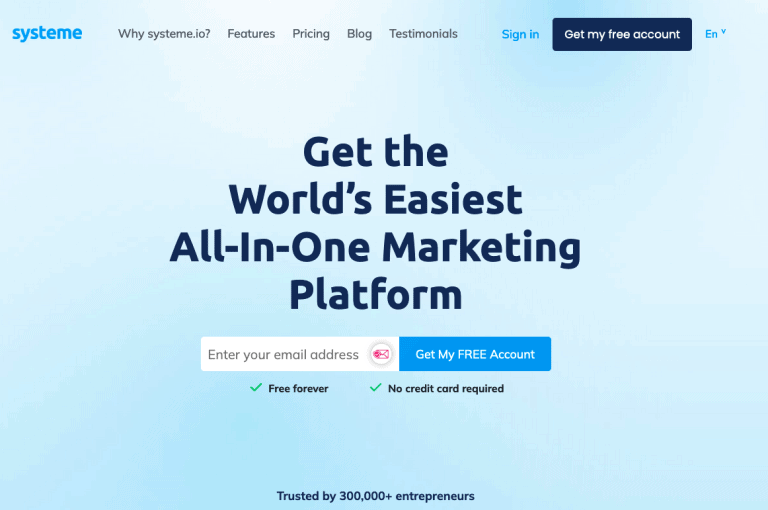
With the power of email marketing, businesses can reach a global audience with ease.
Crafting an effective campaign is more than just about sending out newsletters; it's about connecting with people responsibly.
Recognizing the importance of email marketing ethics (including privacy and data protection) is essential in maintaining trust and achieving a long-lasting impact through your email campaigns.
Adhering to ethical practices in email marketing isn't just good manners; it's a cornerstone of a robust campaign strategy.
When you align your marketing efforts with ethical guidelines, you not only respect your audience's inboxes but also uphold your company's reputation.
This careful balance is key to unlocking the full potential of email marketing without compromising the trust of your target audience.
Principles of Email Marketing Ethics
Email marketing that prioritizes ethical standards is centred on fairness and integrity.
Adopting a truthful approach to promotional emails not only demonstrates respect but also safeguards the privacy and interests of the recipients.
Implement these best practices to maintain a professional demeanor that enhances credibility and fosters a trustworthy reputation for your brand:
- Authenticity: Your messages should reflect the real value of your offerings without misleading subscribers.
- Transparency: Always be clear about the intent of your communication.
- Respect for Privacy: Seek consent through permission-based marketing, ensuring you engage only those who are interested.
- Building Trust: Through consistent and honest dialogue, cultivate long-term relationships for sustained brand loyalty.
- Positive Brand Image: Uphold sincere business ethics to foster a strong and positive perception among your audience.
By adhering to these guidelines, you solidify not just momentary transactions but also durable connections with your customer base, leaning toward a future of mutual growth and respect.
Ethical Practices for Email Campaigns
Acquiring Explicit Authorization
It's your responsibility to secure explicit authorization from individuals before using their data for your email campaigns.
Present them with a choice to affirmatively consent to receive communications by implementing an opt-in system.
Clearly articulate the use of the data they provide, and offer straightforward methods for opting out.
Building a robust foundation of trust with your subscribers is contingent on this transparent exchange.
- Opt-in/Opt-out: Provide subscribers with clear options.
- Information Usage Clarity: Be transparent about how you will use the data.
- Building Trust: Earn trust through honesty and respect for personal choices.
Upholding Subscriber Dignity
Each interaction with your email subscribers should mirror the respect you show customers in person.
To maintain ethical standards in your email campaigns, communicate honestly without resorting to misleading content.
Tailor your communication to match subscriber preferences, ensuring your content is well-received and not perceived as intrusive.
- Honest Communication: Ensure every email reflects integrity.
- Subscriber Preferences: Send content aligned with what your audience prefers.
- Respectful Engagement: Treat subscribers with the utmost respect in every email.
Safeguarding Personal Data
As a trustworthy email marketer, it's imperative to protect the personal data of your subscribers vigilantly.
Secure their information vigilantly, demonstrating your respect for their privacy and fostering a safe environment for data sharing.
- Data Protection Measures: Implement robust data security protocols.
- Respect for Privacy: Handle subscribers' data with the utmost care.
- Information Safety: Reassure your audience that their personal information is in safe hands.
Complying with Data Privacy Laws
Compliance with data protection legislation is non-negotiable.
Your role as an email marketer obliges you to stay abreast of these regulations and integrate them into your email marketing strategy.
This ensures your practices align with legal expectations and shields your campaign from legal consequences.
- Follow Legislation: Stay updated on privacy laws concerning your emails.
- Legal Compliance: Incorporate statutory requirements into your marketing strategy.
- Brand Image and Awareness: Promote a responsible brand image through compliance.
Avoiding Negative Impact
Prioritize the well-being of your subscribers over profit.
Email campaigns should be a beacon for reliability, disseminating beneficial and relevant content.
By focusing on delivering value rather than aggressively pushing sales, you cultivate long-term customer loyalty and minimize the likelihood of unsubscribes.
- Relevant Content: Ensure every email has content that adds value to your subscribers.
- Subscriber Loyalty: Build loyalty by consistently providing helpful information.
- Harm Prevention: Guard against any potential damage from irresponsible email content.
Maintaining Audience Confidence
Securing and protecting the trust of your audience is paramount for a successful email marketing strategy.
Adopting ethical practices and remaining transparent can fortify the bond with your subscribers.
Steer clear of deceptive tactics, ensuring your email subject lines and content are consistently honest.
- Transparent Practices: Keep your marketing practices open and honest.
- Consistent Messaging: Ensure your emails accurately represent your content and offers.
- Nurturing Trust: Develop long-lasting trust through authenticity.
Exemplifying Professionalism
A professional demeanor forms the core of effective email communication.
Maintain a tone devoid of inappropriate humor or offending content, to ensure you resonate with the diverse preferences of your audience.
By adhering to ethical email marketing guidelines, you preserve the integrity and professionalism of your brand.
- Professional Tone: Adopt a professional, unbiased tone in all email communications.
- Appropriate Content: Avoid sensitive or controversial content in your emails.
- Adhering to Guidelines: Stick to guidelines that prevent manipulative or deceptive messaging.
Ethical Concerns in Email Marketing
- Use only opt-in lists: Always obtain consent before adding anyone to your email list. Buying lists or adding recipients without their permission is a violation of trust and could result in legal action.
- Honest content: Ensure all information in your emails is accurate and free from misleading claims.
- Clear subject lines: Craft subject lines that represent the email's actual content. Deceptive tactics to boost open rates can harm your reputation.
- Moderate emailing: Sending too many emails can overwhelm your subscribers and prompt them to unsubscribe.
- Visible subscription options: Subscription and unsubscription options should be clearly accessible to users in all emails.
- Respect data privacy: Never sell or distribute subscribers' personal information without clear consent.
- Avoid spoofing and phishing: Refrain from engaging in practices like email spoofing and phishing, which are illegal and damage your credibility.
- Honor unsubscribe requests: If a recipient opts out, cease sending emails immediately to uphold their decision.
- Relevant content: Always tailor your email content to match the interests and preferences of your audience to maintain engagement.
- Transparent privacy policies: Provide clear information about your data collection, usage, and protection practices to reinforce trust and ensure compliance with the GDPR and other privacy regulations.
Components of Responsible Email Marketing Practices
Location Transparency of Your Company
Your company's legitimacy is bolstered by the inclusion of a concrete location within your email communications.
This could be a post office box, your corporation's actual street address, or an alternative official mailing location.
This information assuages any concerns recipients may have about the authenticity and accessibility of your business.
Offering a Departure Mechanism
Allowing subscribers the freedom to cease receiving emails is as crucial as their initial subscription.
It's vital to include an “unsubscribe” feature that meets legal standards, such as those stipulated by the CAN-SPAM Act and respects the recipient’s desire for reduced email frequency or complete removal from your mailing list.
Prompt Response to Unsubscription Requests
Upon a subscriber's decision to unsubscribe, the CAN-SPAM Act mandates that you must comply with their request within a maximum of ten business days.
The unsubscribe process should be straightforward, ensuring it doesn’t present unnecessary hurdles or dissuade them from opting out of future communications.
Remember, following an unsubscribe, the individual’s information must remain confidential and not be shared or repurposed for other mailing lists.
Strategic Summation
In navigating the digital marketplace, sustaining a trustworthy rapport with your audience is crucial.
By prioritizing ethical email marketing, small businesses can enhance their branding and foster meaningful connections that lead to increased sales.
Upholding privacy and honesty in communications not only respects your potential customers but also distinguishes your brand favorably against competitors, contributing to long-term profitability.
- Online Identity: Craft a unique brand identity through a consistent layout, logo, and slogan.
- Community Engagement: Utilize platforms like Facebook to engage and expand your community.
- Promotional Tactics: Embrace advertising strategies that respect your subscribers' interests and intelligence.
- Sustainability: Aim for a sustainable promotional model that focuses on forming lasting customer relationships.
By implementing these principles, you'll effectively transform your subscribers into repeat customers, ensuring your business's growth is built on a strong ethical foundation.
Common Questions
Defining Consent in Email Campaigns
To engage in email campaigns, you must get clear and affirmative agreement from recipients. This usually involves:
- Receiving explicit permission via opt-in forms
- Providing a clear description of what subscribers will receive
- Ensuring the possibility for users to easily opt out
Remember, consent is not just a courtesy; it's a legal requirement under regulations like GDPR and CAN-SPAM.
Respecting User Data According to Privacy Regulations
The handling of user data must always comply with relevant privacy laws. Consider:
- Being transparent about how you collect and use data
- Implementing robust data protection measures
- Regularly reviewing and updating your privacy policies
In short, treat user data with the utmost care and following legal frameworks.
Transparency Best Practices in Email Interactions
Transparency is key for trust in email communications. Maintain this by:
- Identifying yourself and your organization
- Being upfront about the intent of your emails
- Detailing the use of subscribers' data
This clarity helps build a positive relationship with your audience.
Steering Clear of Spam in Email Marketing
To avoid falling into the spam trap, focus on:
- Sending content that's relevant and valuable to subscribers
- Keeping a consistent yet reasonable email frequency
- Regularly cleansing your email list to maintain engagement
By doing so, you not only respect your audience's inbox but also improve your campaign's effectiveness.
Ethical Management of Email Lists
When managing your email lists, ethical considerations should guide you:
- Never purchase email lists and only use organically grown ones
- Implement a double opt-in to confirm subscriber interest
- Promptly honor unsubscribe requests to maintain integrity
The Importance of Honesty in Promotional Emails
Honesty in promotional content is non-negotiable.
Ensure that:
- Your subject lines truthfully reflect the email content
- Any claims or offers are depicted accurately and can be substantiated
- Disclaimers and necessary information are not omitted
Being honest fortifies trust and credibility with your subscribers.
Share Your Journey, Learn More, and Thrive
I would love to hear about your experiences, challenges, and successes in the realm of affiliate marketing.
Share your thoughts, questions, or stories in the comments section below.
Let's build a community of aspiring and experienced affiliate marketers, supporting one another on this exciting journey.
For more valuable insights, tips, and guidance on affiliate marketing, subscribe to our newsletter.
Stay updated with the latest trends, tools, and strategies that can empower you in your pursuit of affiliate marketing success.




